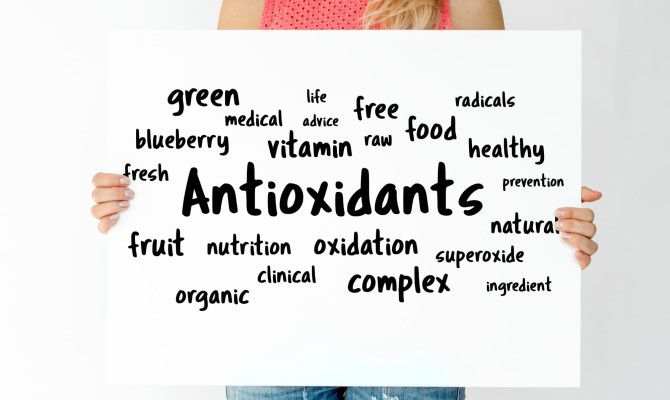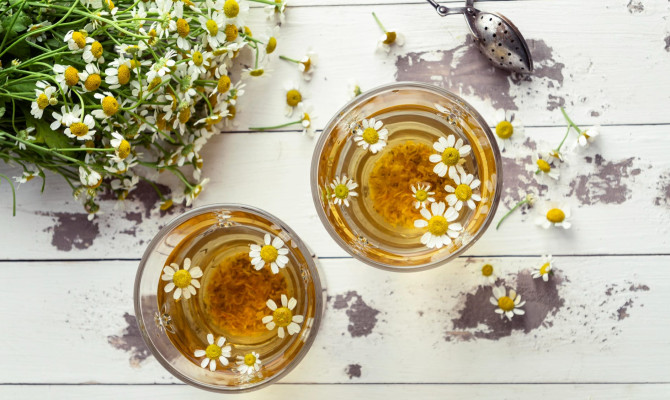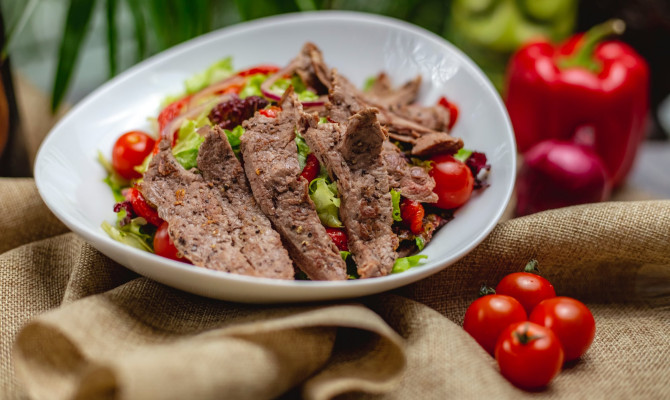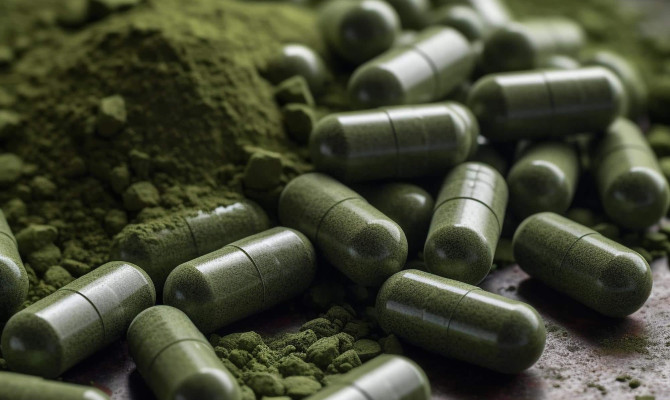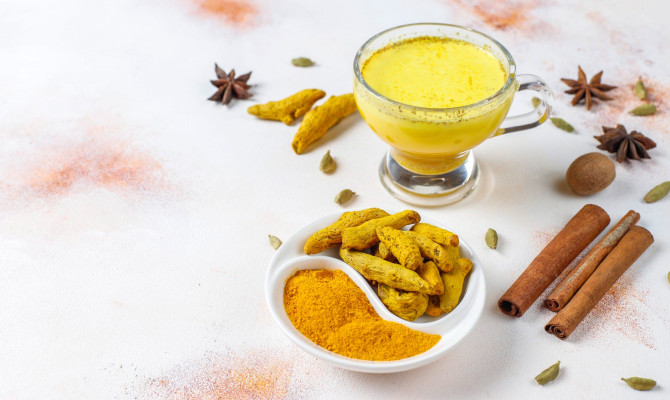Superfood Spirulina: Exploring the Nutrition and Health Benefits

- Spirulina
- 17 Aug 2023
Overview
What is Spirulina?
Spirulina is a form of cyanobacteria, a group of single-celled microorganisms also referred to as blue-green algae. Spirulina has been termed a superfood since it is high in vitamins, minerals, protein, and antioxidants. Humans and animals can consume it. The microscopic algae spirulina thrives in warm, alkaline environments. It has received a lot of attention recently after NASA recommended that it may be cultivated in space for astronauts to use because of its high nutritious content and potential health benefits.
In this article, we’ll look at the nutrient content, metabolism, health benefits, dose, side effects, risks, precautions, and drug interactions of spirulina.

Key Facts
- Blue-green algae earned their name from their color, which is caused by phycocyanin production.1Overview| Researched based study from Nlm.nih.gov
- Spirulina has been considered the first superfood in the world due to its eco-sustainability and comprehensive nutritional profile.
- There are numerous spirulina species, but only a few of them are listed on the labels of commercially accessible goods, and the most common are Spirulina maxima and Spirulina platensis.
- Spirulina is an easily digestible meal. Its nutrients are easily absorbed by the body, facilitating effective metabolism and use.
Nutritional value
Nutritional value of Spirulina
One tablespoon or 7 grams of dried spirulina contains:
- Calories – 20.3 kcal
- Protein – 4.02 g
- Carbohydrates – 1.67 g
- Fat – 0.54 g
- Water – 0.328 g
- Fiber – 0.54 g 2Nutrition| Researched based study from Usda.gov
Minerals
- Potassium – 95.2 mg
- Sodium – 73.5 mg
- Magnesium – 13.6 mg
- Calcium – 8.4 mg
- Phosphorus – 8.26 mg
- Iron – 2 mg
- Copper – 0.427 mg
- Zinc – 0.14 mg
- Manganese – 0.13 mg
- Selenium – 0.504 µg
Vitamins
- Choline – 4.62 mg
- Niacin – 0.896 mg
- Vitamin C – 0.707 mg
- Vitamin E – 0.35 mg
- Riboflavin – 0.257 mg
- Pantothenic acid – 0.244 mg
- Thiamin – 0.167 mg
- Vitamin B6 – 0.025 mg
- Vitamin A – 39.9 IU
- Beta Carotene – 23.9 µg
- Folate – 6.58 µg
- Vitamin K – 1.78 µg 2Nutrition| Researched based study from Usda.gov
Health Benefits
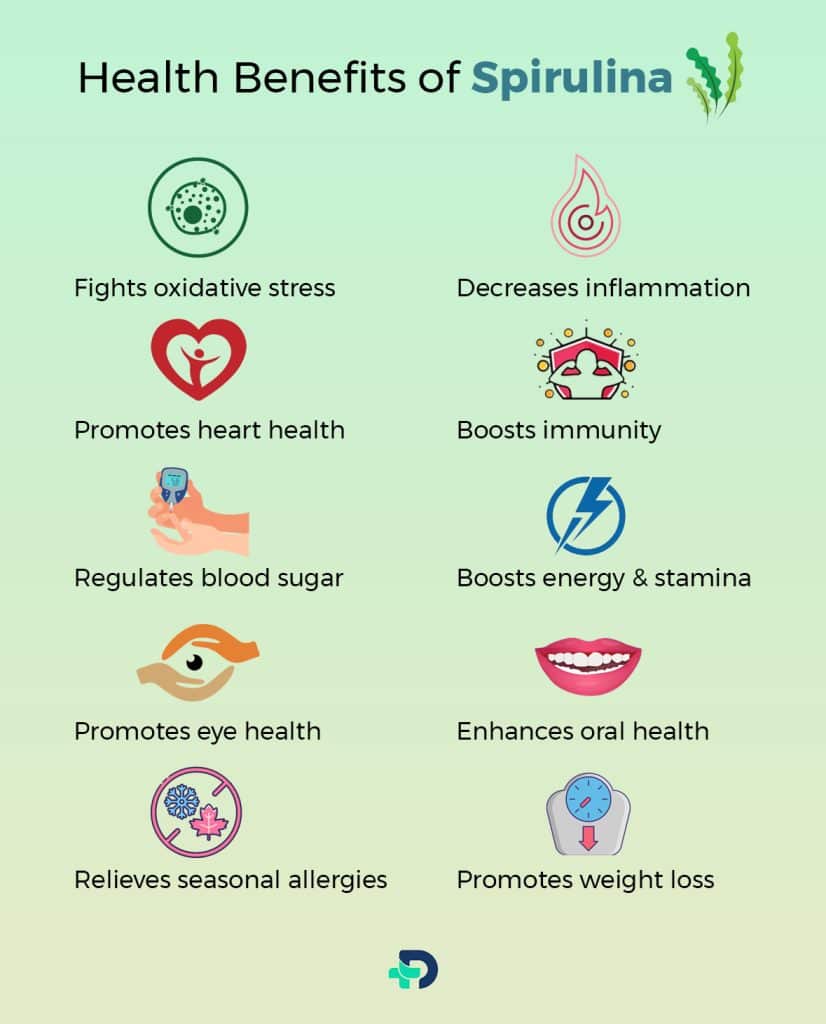
Health Benefits of Spirulina
Spirulina has various health benefits, including
- Fights oxidative stress
- Decreases inflammation
- Promotes heart health
- Boosts immunity
- Regulates blood sugar
- Boosts energy and stamina
- Promotes eye health
- Enhances oral health
- Relieves seasonal allergies
- Promotes weight loss
Fights oxidative stress
- Spirulina contains antioxidants such as beta carotene, phycocyanin, and chlorophyll, which protect the body from oxidative stress.3Health benefits| Researched based study from Nlm.nih.gov
- It also decreases inflammation, which may help to avoid chronic conditions, which include heart disease and cancer.4Health benefits| Researched based study from Nlm.nih.gov
Decreases inflammation
- Phycocyanin has powerful anti-inflammatory properties and may fight free radicals and stop synthesizing chemicals that promote inflammation.5Health benefits| Researched based study from Nlm.nih.gov
Promotes heart health
- Spirulina may aid in lowering bad cholesterol and triglyceride levels while boosting good cholesterol and regulating blood pressure,6Health benefits| Researched based study from Nlm.nih.gov promoting a healthy heart.5Health benefits| Researched based study from Nlm.nih.gov
Boosts immunity
- Spirulina boosts the immune system by encouraging the formation of antibodies and other immune cells and strengthening the body’s resistance against infections.7Health benefits| Researched based study from Nlm.nih.gov
Regulates blood sugar
- Research suggests that spirulina could assist in regulating blood sugar levels, making it potentially advantageous for people with diabetes or those at risk of acquiring the disease.8Health benefits| Researched based study from Nlm.nih.gov
Boosts energy and stamina
- Spirulina’s high nutrient content delivers a natural power boost and helps avoid exhaustion, making it famous among athletes and anyone who leads active lives.9Health benefits| Researched based study from Nlm.nih.gov
Promotes eye health
- Spirulina has the potential to be used as a supplement of nutrients to prevent future vision loss caused by oxidative damage.10Health benefits| Researched based study from Nlm.nih.gov
Enhances oral health
- It helps in treating gum disease with its anti-inflammatory property. It also helps prevent oral cancer.11Health benefits| Researched based study from Nlm.nih.gov
Relieves seasonal allergies
- Spirulina ingestion improved symptoms like discharge from the nose, sneezing, stuffy nose, and itching in patients with allergic rhinitis.12Health benefits| Researched based study from Nlm.nih.gov
Promotes weight loss
- Spirulina decreases oxidative stress, prevents fat buildup in the liver, and enhances sensitivity to insulin and a sense of fullness.13Health benefits| Researched based study from Nlm.nih.gov
Dosage
Spirulina dosage
- Spirulina is available in both dry and freeze-dried forms.
- Spirulina supplements can be bought as a tablet, powders, or flakes.
- Spirulina dose may vary among individuals according to age, health status, and intended use.
- It is usually advised to begin with a daily dose of 2-3 grams (4-6 pills of 500 mg each) and progressively raise it as tolerated.14Dosage| Researched based study from Mountsinai.org
- Nevertheless, it is recommended that you speak with a healthcare practitioner to identify the proper dosage for your unique needs.
- Dosage for children under 18 should be consulted with a doctor.
Side effects
Side effects of Spirulina
Side effects of spirulina are typically mild and may include:
- Diarrhea
- Vomiting15Side effects| Researched based study from Medlineplus.gov
- Dizziness
- Nausea
- Headache
- Flatulence
People need to be informed of the possible hazards and risks of spirulina, which may include:
Allergic Reactions
- People with an allergy to seafood, shellfish, or any algae might also have a reaction or allergy to spirulina. They should consult a doctor immediately if they experience allergic reactions like swelling of the face, lips, or tongue swelling, breathing difficulties, or swallowing difficulties.
May aggravate an autoimmune disorder
- Spirulina can boost the immune system, which could be troublesome for people with autoimmune diseases.
Reduces blood clotting potential
- Spirulina has an anticoagulant effect, which can thin the blood and prolong the time it takes for blood to clot.16Side effects| Researched based study from Nlm.nih.gov
Risk of contamination
- Wild-harvested spirulina carries a high risk of contamination with bacteria, heavy metals, or dangerous compounds called microcystins.17Side effects| Researched based study from Nlm.nih.gov
Digestive Issues
- May be seen when used in high amounts resulting in nausea, diarrhea, or flatulence.
Precautions
Precautions
- Always begin spirulina supplements with a low dose and slowly increase it to reduce the chance of allergic reactions and adverse effects.
- Choose a reputed company that regularly tests its goods for heavy metals, toxins, and microbiological contaminants to avoid spirulina supplement contamination.
- Avoid giving spirulina to a child under 18 without consulting a doctor, as they are more sensitive to contaminants than a fully grown adult.
- People with autoimmune illnesses, such as lupus, rheumatoid arthritis, or multiple sclerosis, should avoid spirulina supplements since they may activate their immune system.
- People with phenylketonuria (PKU) shouldn’t consume spirulina because they cannot break down the amino acids like phenylalanine found in it.
- Pregnant or breastfeeding women should not consume spirulina supplements since they may contain contaminants passed on to the infant and cause difficulties.
- Individuals taking blue-green algae supplements should cease taking them at least two weeks before surgery to avoid interfering with blood sugar control and clotting.18Precautions| Researched based study from Harvard.edu
Interactions
Spirulina interactions
Spirulina may interact with the following medications:
Blood sugar lowering medicines
- When consumed along with blue-green algae supplement, may reduce blood sugar to dangerously low levels, as spirulina also has been shown to lower blood sugar levels.15Interactions| Researched based study from Medlineplus.gov
Medicines to suppress immunity
- May be given in patients with autoimmune disorders or after transplant surgery, and spirulina supplementation could reduce their effectiveness and enhance the immune system activity.
Blood clotting medications
- Blue-green algae may slow blood clotting. Taking blue-green algae with drugs that decrease blood clotting may raise the likelihood of bleeding.15Interactions| Researched based study from Medlineplus.gov
Iron supplements
- Spirulina supplements can lower the amount of iron that the body can absorb through food or supplements.19Interactions| Researched based study from Nlm.nih.gov
To avoid any interactions, talking with the healthcare professional if you’re using any medications is critical.
Bottom line
The Bottom Line
Spirulina algae is a high-nutrient superfood with several health advantages. However, it is critical to be aware of potential adverse effects, follow suggested dosages, and evaluate any pre-existing medical conditions or prescription combinations. Spirulina is simple to sneak into one’s diet by mixing it into smoothies, dips, sauces, or baked goods. Before beginning any new dietary supplement, consult with a healthcare practitioner, particularly those with any current health concerns or who are using any medications.
Any feedback on this article?
 This Articles content was accurate
This Articles content was accurate Very Informative Article
Very Informative Article I have a question or a comment
I have a question or a comment
 This article contains inaccurate content
This article contains inaccurate content This article was not helpful
This article was not helpful I have a question or a comment
I have a question or a comment
We appreciate your helpful feedback!
Checkout our social pages
References
-
National Library of Medicine
Wide Range Applications of Spirulina: From Earth to Space Missions | Overview
-
U.S. DEPARTMENT OF AGRICULTURE
Seaweed, spirulina, dried | Nutrition
-
National Library of Medicine
Spirulina supplementation as an adjuvant therapy in enhancement of antioxidant capacity: A systematic review and meta-analysis of controlled clinical trials | Benefits
-
National Library of Medicine
The efficacy of dietary Spirulina as an adjunct to chemotherapy to improve immune function and reduce myelosuppression in patients with malignant tumors | Benefits
-
National Library of Medicine
Hypolipidemic, Antioxidant and Antiinflammatory Activities of Microalgae Spirulina | Benefits
-
National Library of Medicine
Effect of Spirulina Supplementation on Systolic and Diastolic Blood Pressure: Systematic Review and Meta-Analysis of Randomized Controlled Trials | Benefits
-
National Library of Medicine
The effects of Spirulina on anemia and immune function in senior citizens | Benefits
-
National Library of Medicine
The effect of spirulina on type 2 diabetes: a systematic review and meta-analysis | Benefits
-
National Library of Medicine
Algae Supplementation for Exercise Performance: Current Perspectives and Future Directions for Spirulina and Chlorella | Benefits
-
National Library of Medicine
Dietary Spirulina Supplementation Protects Visual Function From Photostress by Suppressing Retinal Neurodegeneration in Mice | Benefits
-
National Library of Medicine
Clinical Effects of Subgingivally Delivered Spirulina Gel in Chronic Periodontitis Cases: A Placebo Controlled Clinical Trial | Benefits
-
National Library of Medicine
Complementary Therapies in Allergic Rhinitis | Benefits
-
National Library of Medicine
Effects of spirulina on weight loss and blood lipids: a review | Benefits
-
Mount Sinai
Spirulina | Dosage
-
Medline Plus
Blue-Green Algae | Side effects
-
National Library of Medicine
Anticoagulant activity of a sulfated polysaccharide from the green alga Arthrospira platensis | Side effects
-
National Library of Medicine
The Fate of Microcystins in the Environment and Challenges for Monitoring | Side effects
-
Harvard Health Publishing
By the way, doctor: Is spirulina good for you? | Precautions
-
National Library of Medicine
Effect of Spirulina maxima Supplementation on Calcium, Magnesium, Iron, and Zinc Status in Obese Patients with Treated Hypertension | Interactions












